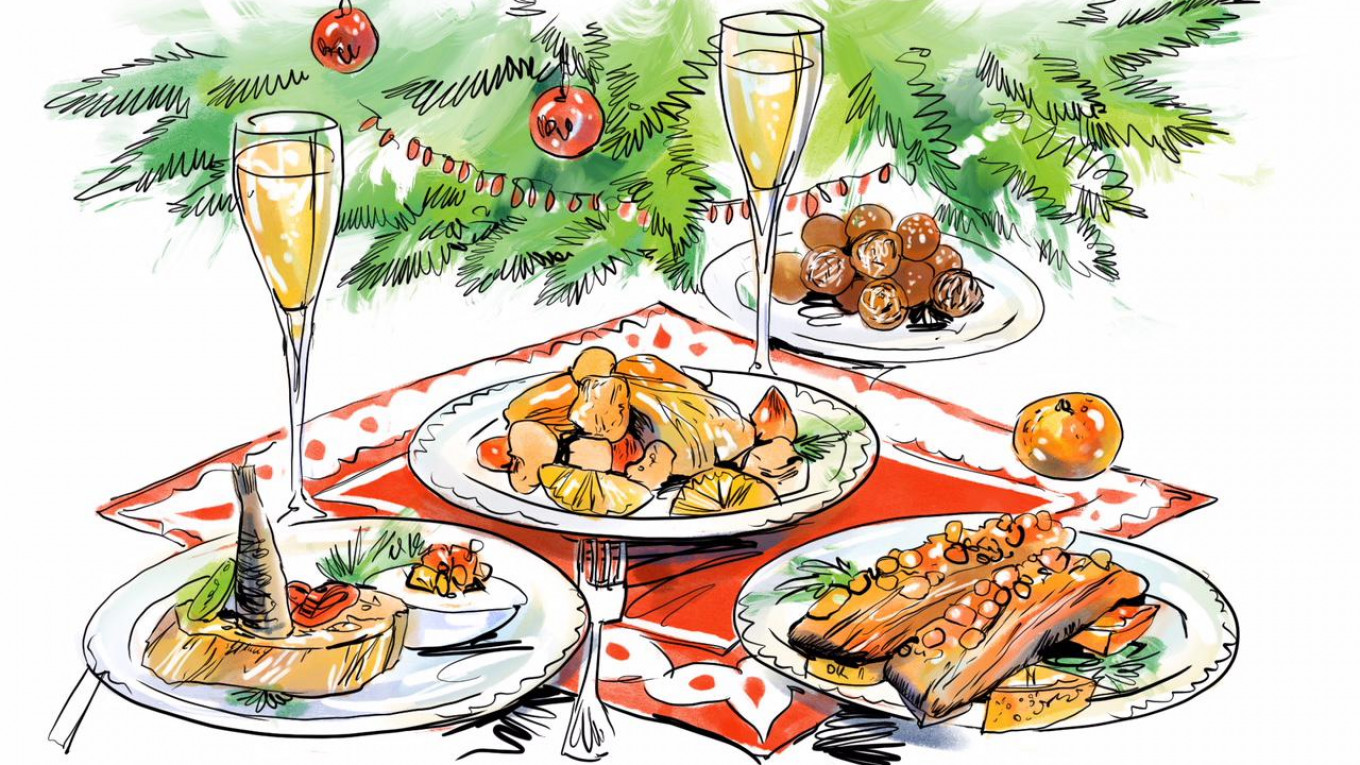It was worth a try.
It’s always worth a try.
“Darling,” I said to my Russian husband,” in a hopeful tone.
“Hmmm?” he said, not raising his eyes from his iPad.
“What if this New Year’s Eve I made something different — “
“No,” he said, inserting one earbud into his left ear in a manner that suggested the conversation was over.
“Fair enough,” I sighed and pulled out a fresh piece of paper to make a list for the market. It was a list I knew by heart and one that does not offer much scope to get the creative culinary juices flowing.
“Potatoes,” it began, an asterisk alongside to indicate a prodigious amount. “Beets, tangerines, herring, pickles, champagne, vodka, Prosecco, carrots, chocolate, scallions,” it continued before finishing up with one last work, writ large, in bold capital letters and underlined several times to leave no doubt as to its primary role, “Mayonnaise.”
The classic Soviet New Year’s menu is as resistant to change as the current regime. It all hinges on two mandatory, incredibly labor-intensive, mayonnaise-based cold salads: Salad “Olivier” and Herring Under Fur Coat. While supremely unpalatable to any but the Russian tongue, these dishes nevertheless take pride of place on the festive board, alongside other zakuski (appetizers): smoked meats, salted and smoked fish, caviar, and marinated and pickled vegetables.
In one of the opening scenes of the iconic holiday film “The Irony of Fate,” the hero Zhenya’s mother resignedly dices potatoes and carrots for Salad “Olivier.” She comments, in that long-suffering Orthodox Christian martyr manner Russian mothers-in-law have perfected down the ages, that Zhenya’s girlfriend, Galya, appears to be too busy to make the traditional New Year’s menu for him. The message of “Irony of Fate” is abundantly clear: if you want to get to Happily Ever After with your own romantic hero, then you too must master the art of the Russian New Year’s salad.
I’ve spent about two decades doing just that, which is why I now feel entitled to exercise a teeny tiny bit of poetic license. So, this year, I’ve deconstructed the menu by taking it down to the culinary studs.
In place of the rigid menu, I'm constructing something that is true to the ingredients and flavors of a traditional Soviet New Year’s Eve menu but healthier and (hopefully) happier with the introduction of some new flavor elements alongside the main players.
The golden thread that pulls this meal together is tangerine, a rare and exotic fruit in Soviet times that was reserved and revered as an exceptional New Year’s holiday treat. For any Russian, tangerines are the taste of childhood and holiday magic, and for this reason, I’ve incorporated them throughout this meal as flavor elements rather than just pieces of fruit.
Cocktails & Canapés
Vodka Mandartini
Tangerine Champagne Cocktail Punch
Latvian Sardine Crostini
Deviled Eggs with Herring
At the Table
Salad “Olivier” in Pastry Cups
Roasted Beet Salad with Tangerine Ginger Vinaigrette
Roasted Salmon with Tangerine Soy Glaze
Ponzu Sesame Cucumber Salad
Dessert
Tangerine Granita
Chocolates
Kick off the Evening with Cocktails & Canapés
Festive parties need festive cocktails to get the ball rolling, which is why I always try to kick evenings off with something boozy and sparkly in a champagne coupe. For New Year’s Eve, I’ve chosen two that introduce the recurring theme of tangerines.
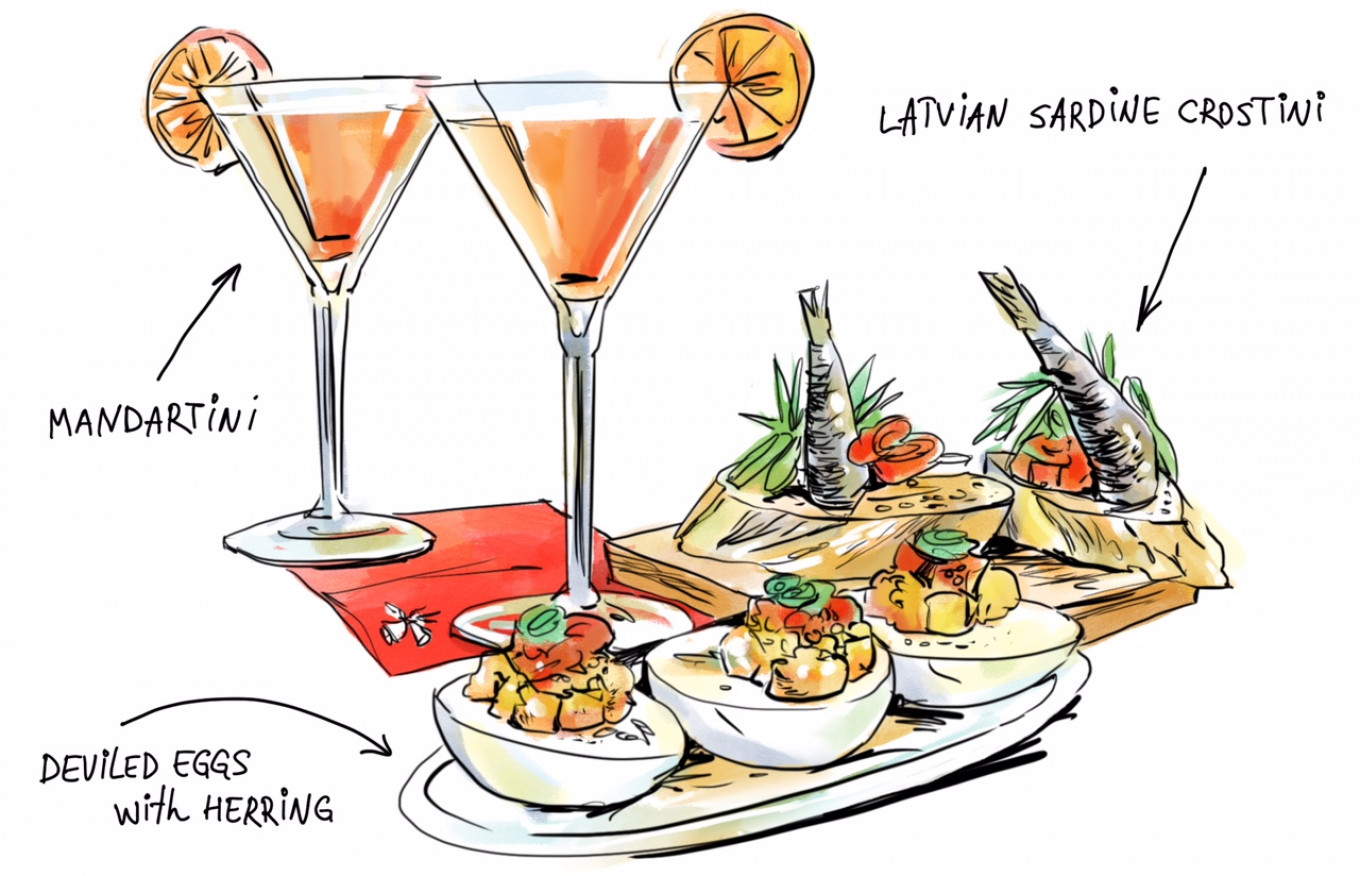
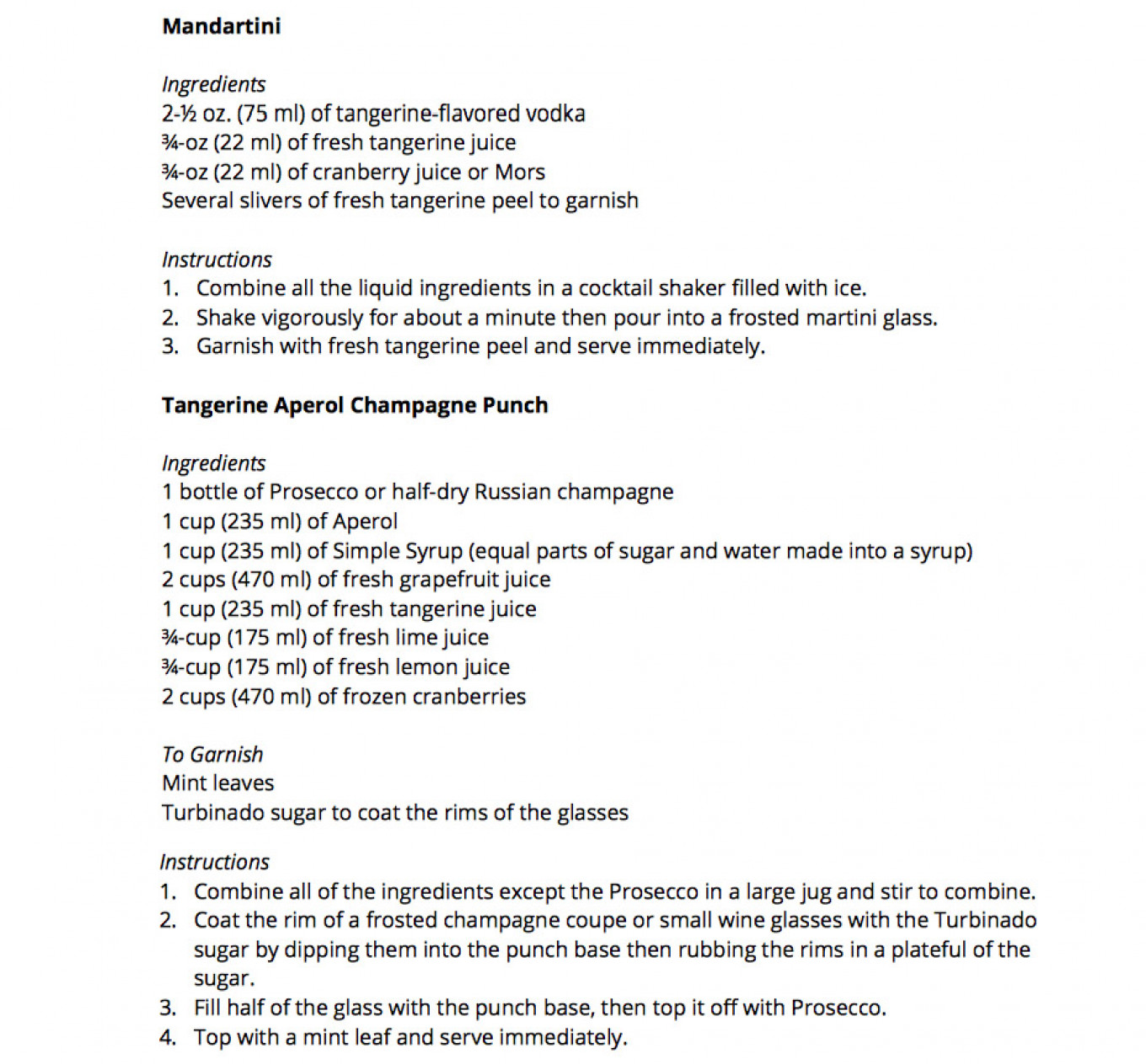
I also like to break with Russian tradition by leaving my guests standing — and ideally circulating and getting to know one another — for this part of the evening. To encourage this, I pass plates of crostini featuring lovely oily Latvian sardines, which are so much a part of the standard New Year menu that Russian authorities recently relaxed the 2015 Russian ban on Baltic fish imports to ensure that everyone could enjoy this oily, fishy taste of childhood.
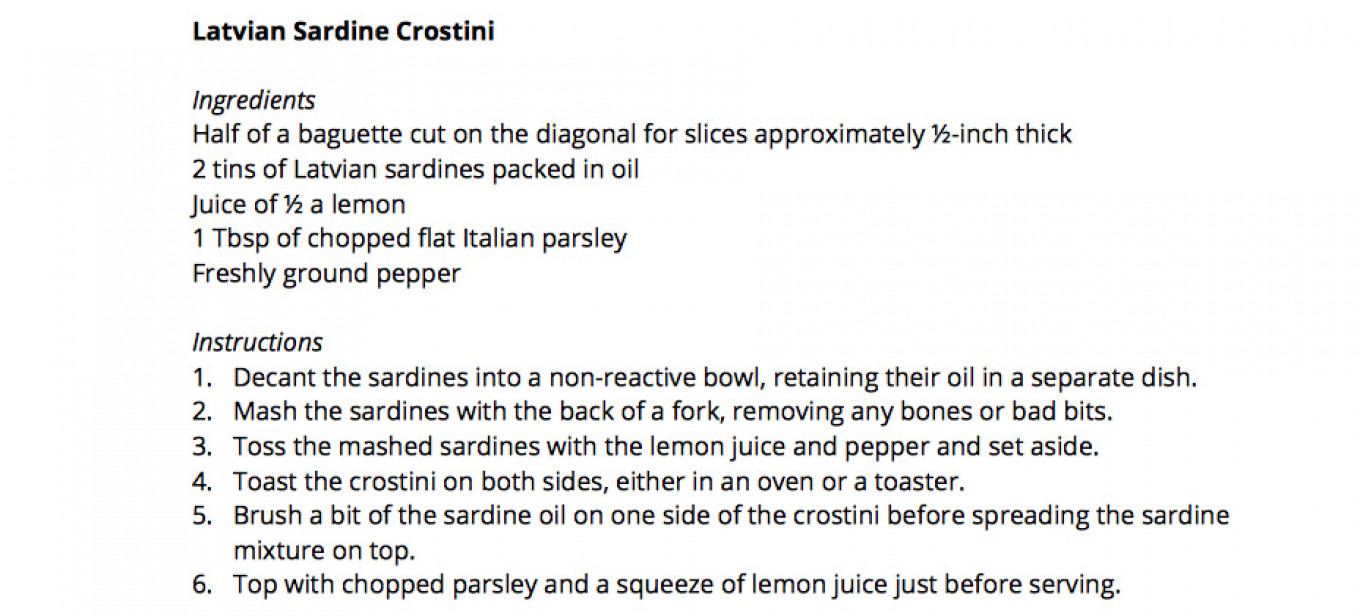
My other canape is part of the deconstructed Herring Under Fur Coat, now reconstructed as deviled eggs with herring on top.
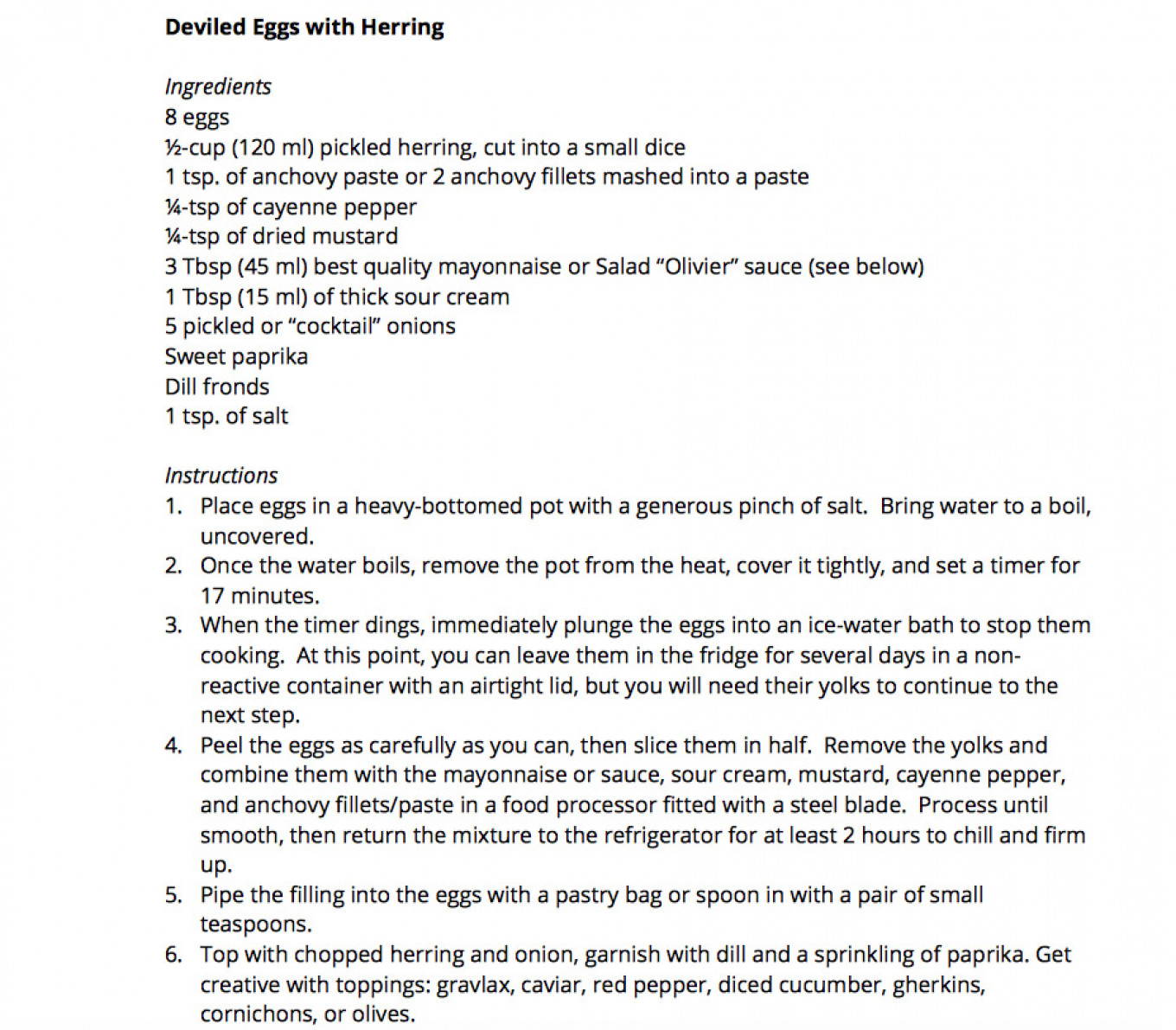
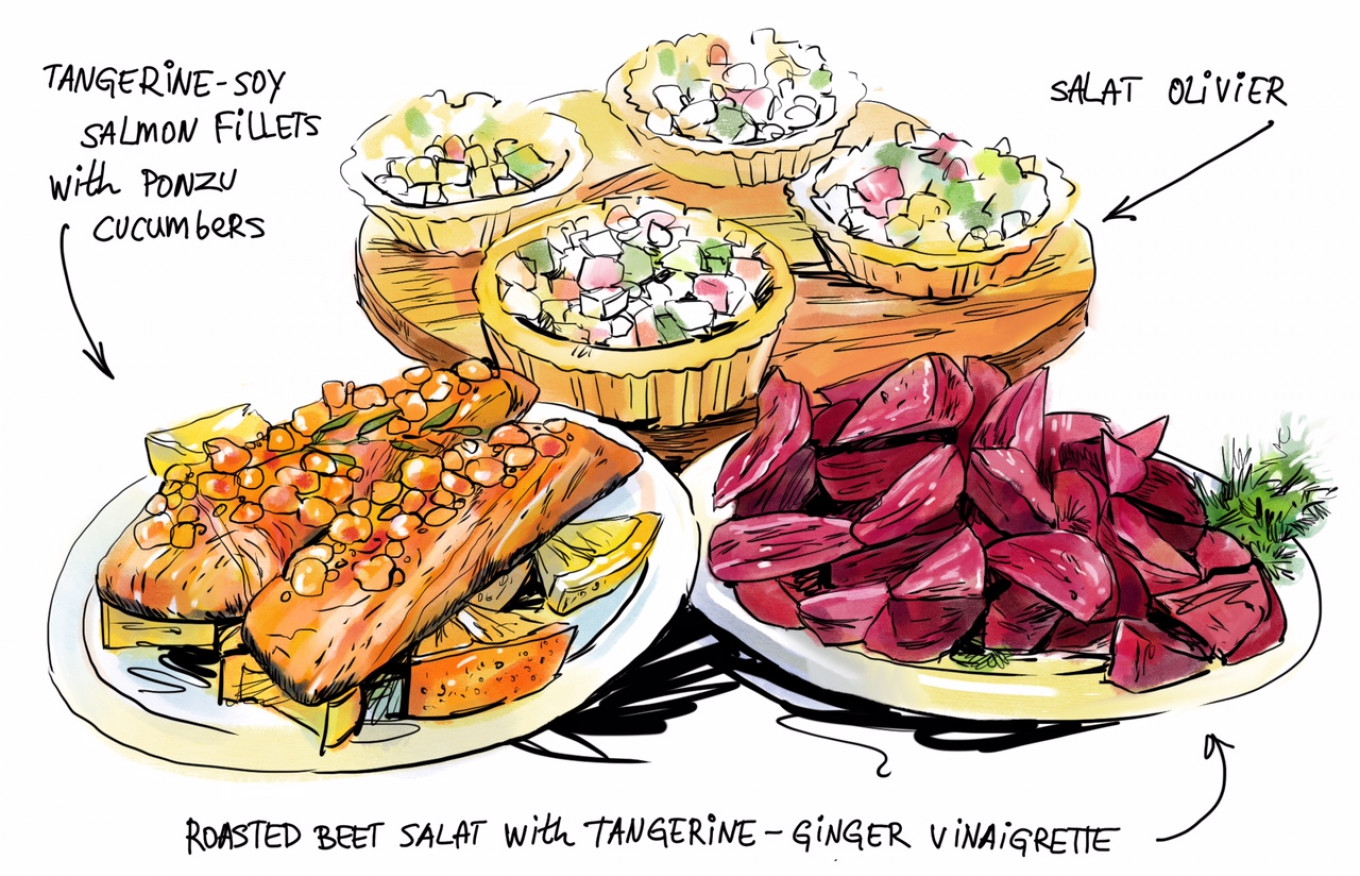
At the Table
The Soviet version of Salad “Oliver” is the sine qua non of the New Year’s menu, but there is nothing in the unwritten playbook to prevent me from reverting to a pre-revolutionary recipe of Olivier, which is as much like the Soviet version as the Orient Express is to Metro North.
The renowned Belgian chef M. Olivier invented the salad that bears a version of his name in the late nineteenth century for an upscale Moscow restaurant. As soon as it debuted, it was an instant hit with the restaurants tony patrons, largely thanks to the secret sauce, which Olivier guarded jealously throughout his life and ultimately took to his grave. We know, however, from enthusiastic contemporary accounts that it was subtly tart, velvety smooth, and slightly spicy.
Several nineteenth-century cookbook writers attempted to recreate the recipe, listing all manner of interesting ingredients such as grouse and crayfish, which are far more intriguing than bland, tinned ham.
It was a recipe by P.P. Alexandrova-Ignatieva, in her 1909 cookbook, “The Practical Basics of the Culinary Arts,” that got me excited. She wrote that Salad “Olivier” contained cubed aspic, my cue to rescue this dish. Several years of experimentation have yielded the following recipe that uses the lightest dressing, spiked with mashed capers and a lot of lemon juice to both lighten up and boost flavor. Cubes of aspic made from chicken stock, Madeira, and gelatin provide a subtle gamey taste, which compliments duck confit and bacon as the main meat component.
My version of Salad “Olivier” is no less time consuming than the Soviet version and the gelatin cubes, however improbable they sound, really elevate this stodge into something very special. Even my Russian husband admits that this he prefers this version to any other.
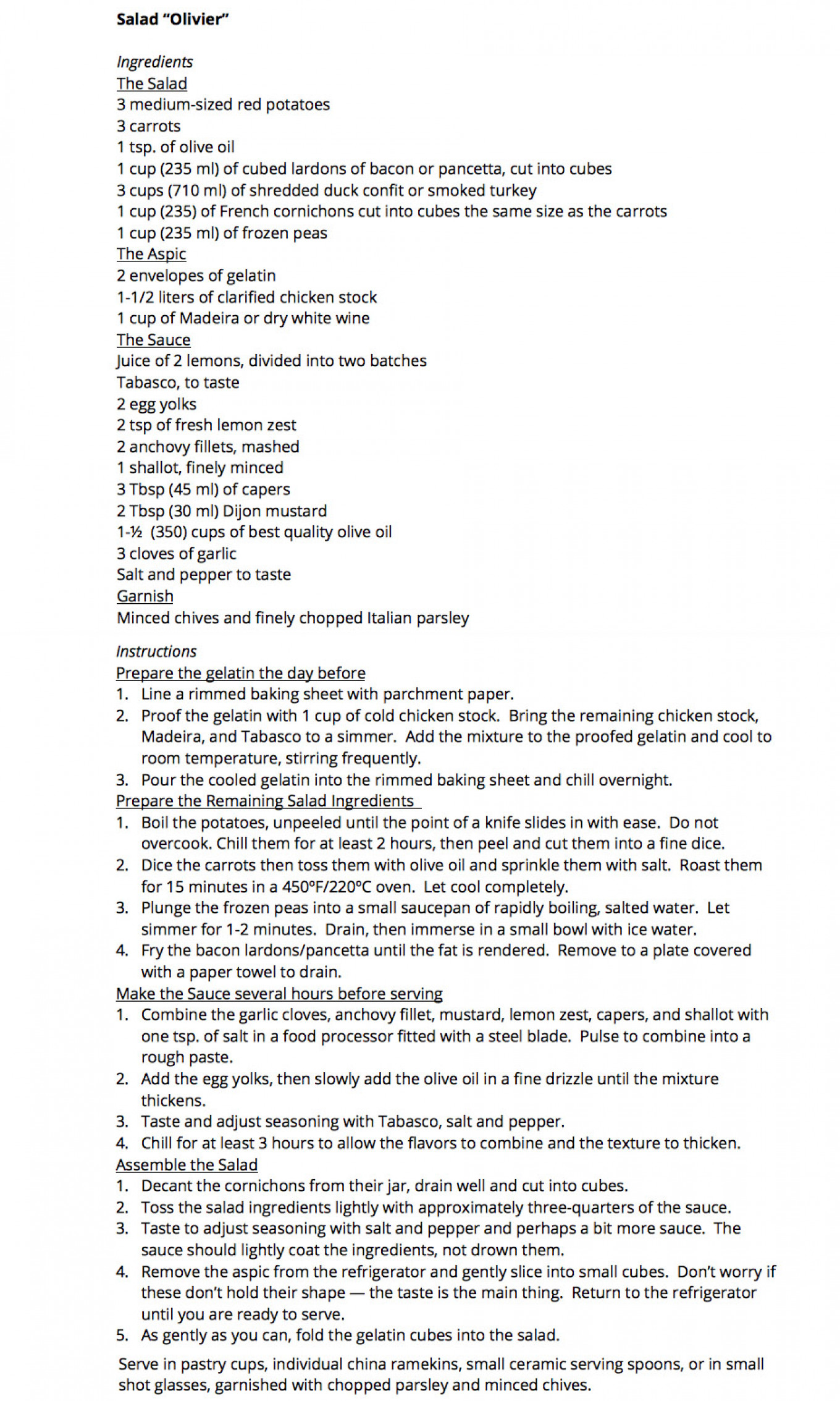
Herring Under Fur Coat
has a certain lurid fascination: such an incongruous mix of ingredients that
have no business being together in one dish, but somehow the Russians get away
with it. Boiled beets, boiled potatoes,
pickled herring, pickled gherkins covered with grated hard-boiled egg and
cheese — the “fur coat” — dressed with lashings of synthetic mayonnaise — all a
bright violet.
I draw the line at Herring Under Fur Coat. It needs to be undressed. I’ve taken the beets out of the mix completely and parlayed them into a lighter roasted beet salad with accents of tangerine. The herring and the eggs got repurposed into deviled eggs.
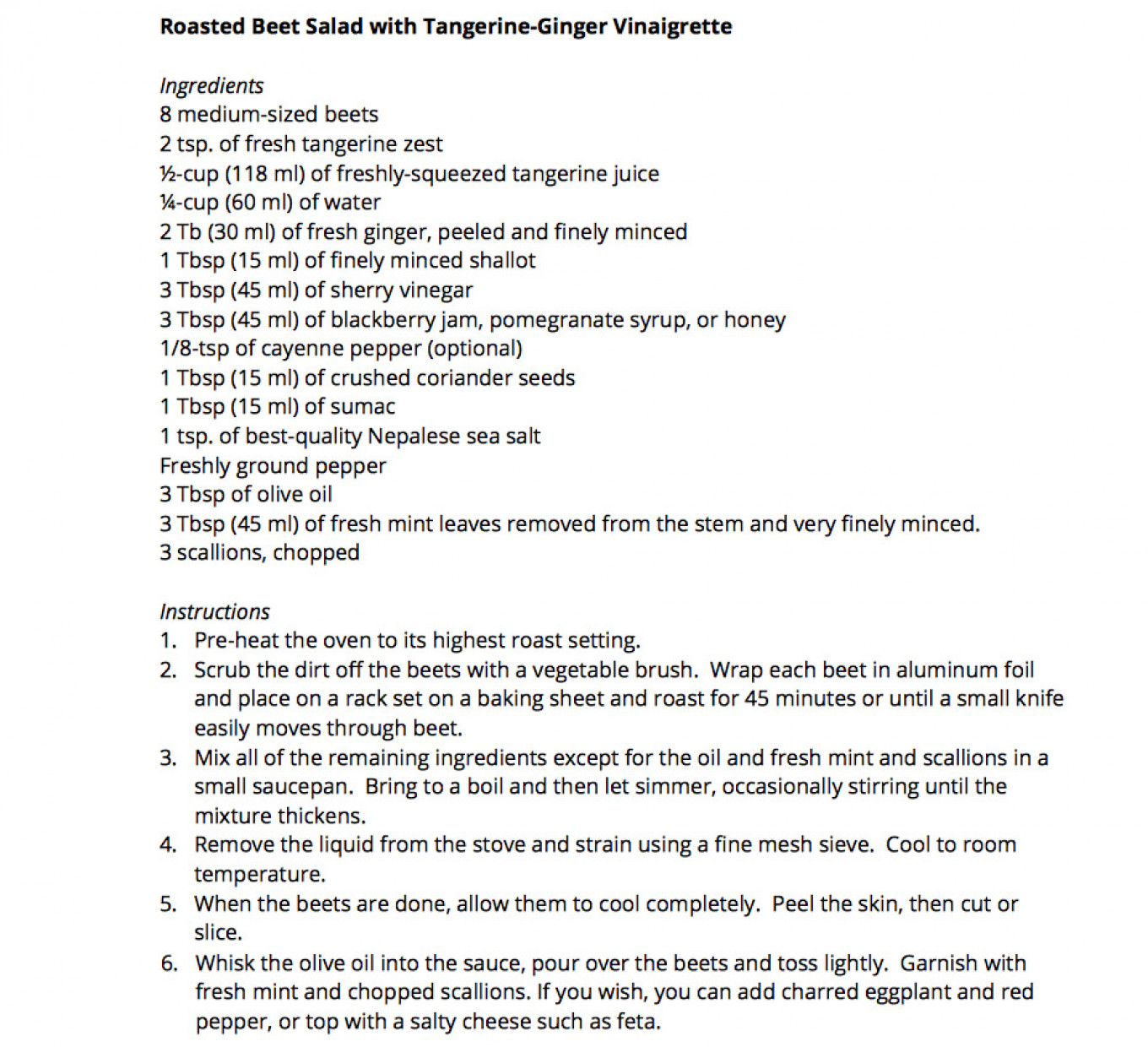
When it comes to Russian New Year’s Eve, I’m not going to expend more energy on the main course than is absolutely necessary. By the time it’s brought out, the guests have already eaten two meals worth of canapes and salads. That’s where this distinctly unfussy, simple recipe for salmon comes in. Tangerine makes another sneak appearance here, as do some Asian accents.
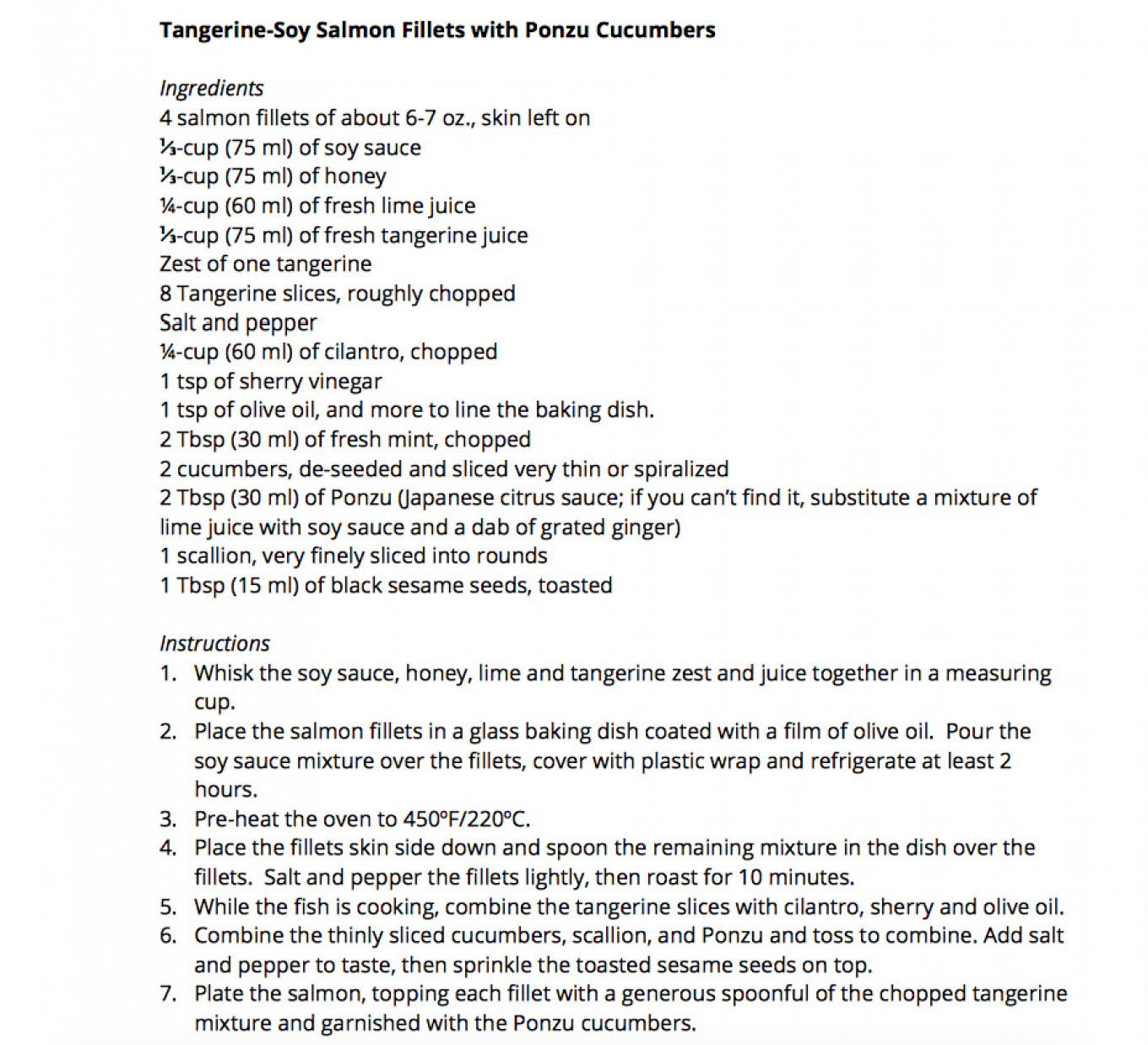
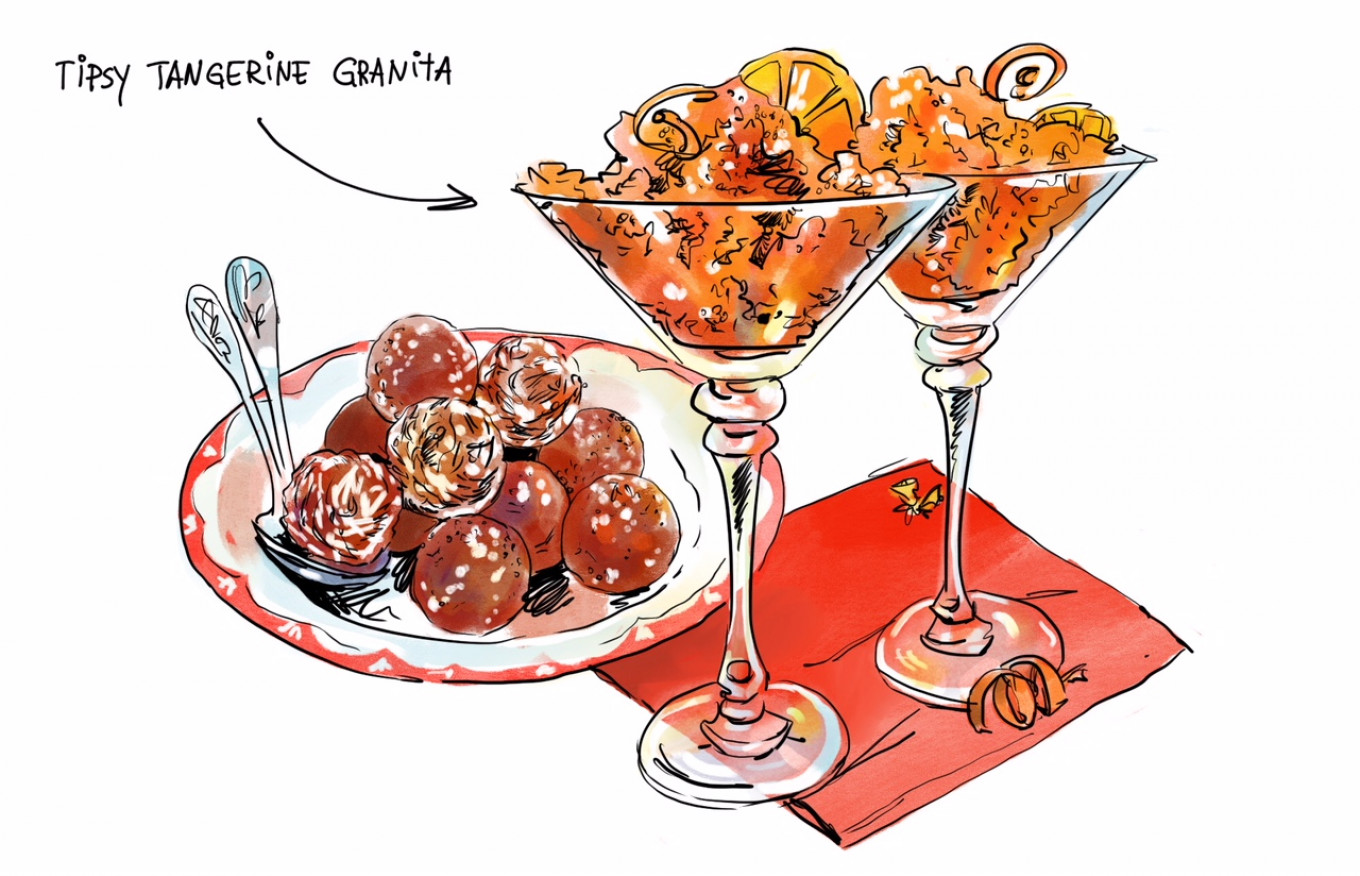
Winding Things Down: Dessert
One thing you can definitely count on if you are hosting a Russian New Year’s Party is a lot of lovely chocolate coming your way. Plan on receiving at least one box of very fancy chocolates, exponentially more if you are a woman and work in an office. Happily, this means there is really no need to worry too much about dessert — you have the sweet coda to your New Year’s Eve symphony pretty well locked down.
But if you feel you want to press folks to eat dessert, my advice is to go for something that will provide a nice contrast to the richness and sweetness of the Russian chocolate. Tangerines make a final appearance in this lovely, light granita, the perfect prelude to a month of detoxing!

Happy New Year!
Jennifer Eremeeva is a veteran expatriate writer who explores Russian culture, cuisine, and history on jennifereremeeva.com.
A Message from The Moscow Times:
Dear readers,
We are facing unprecedented challenges. Russia's Prosecutor General's Office has designated The Moscow Times as an "undesirable" organization, criminalizing our work and putting our staff at risk of prosecution. This follows our earlier unjust labeling as a "foreign agent."
These actions are direct attempts to silence independent journalism in Russia. The authorities claim our work "discredits the decisions of the Russian leadership." We see things differently: we strive to provide accurate, unbiased reporting on Russia.
We, the journalists of The Moscow Times, refuse to be silenced. But to continue our work, we need your help.
Your support, no matter how small, makes a world of difference. If you can, please support us monthly starting from just $2. It's quick to set up, and every contribution makes a significant impact.
By supporting The Moscow Times, you're defending open, independent journalism in the face of repression. Thank you for standing with us.
Remind me later.



